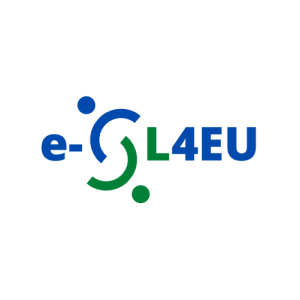Programme Erasmus+ Key Action 2: Partnerships for Cooperation
2021-1-PL01-KA220-HED-00003
The project focuses on emergence of e-Service-Learning as an innovative pedagogical approach based on experiential learning within the context of higher education in Europe. e-SL is a course-based, credit-bearing educational experience in which students participate in an organized service activity that meets identified community needs, and they reflect on the service activity in such a way as to gain further understanding of course content, a broader appreciation of the academic discipline, and enhanced sense of civic responsibility.

In e-SL the educational experience is mediated by Information and Communication Technologies (ICTs) wherein the instructional component, the service component or both are conducted online, often in a hybrid model. As such, e-Service-Learning provides many opportunities in distance education, because it offers an experiential praxis in which students are involved through technology in civic enquiry, in reflections and actions, collaborating with the community. In this context, particularly important aspects are: 1. the capacity and readiness of HEI teachers to manage an effective shift towards socially inclusive digital education, based on an innovative pedagogical approach that integrates community service into the students’ curriculum (Need 1); 2. the digital and instructional design skills of the lecturers, so to exploit the opportunities that new technologies ensure also for Service-Learning(Need2); 3. the shift from a transmissive model into an innovative pedagogical approach that integrates community service into students’ curriculum (Need 3) 4. the active role of users/ students, that should be aware of the opportunities ensured by e-SL (Need3); 5. the possibility to measure the impact of the e-SL activities both on students’ learning and on the community (Need4); 6. the focus on the digital skills and competencies that students can develop through e-SL activities (Need5) 7. the possibility to exchange best-practices and guidelines for the organisation of e-SL projects (Need 6).
Project objectives:
-
To build learning systems with an innovative pedagogical approach that integrates community services into the students’ curriculum
-
To promote a change in the traditional assistive model (service for the community) to a horizontal model of solidarity (service with the community)
-
To spread the knowledge on e-SL methodologies developing training materials for academics to adopt e-SL in their teaching practices, guiding their students in implementing e-Service-Learning and assessing their learning while addressing social needs of people with fewer opportunities, especially in cases of emergencies such as the pandemic or other disruptive events.
-
To develop HE lecturers/trainers/students’ digital skills aimed at the implementation of e-SL methodologies
-
To involve local community agencies (NGOs and LAGs) to increase the local impact of international activities
Project results:
PR1 – Design principles for e-SL projects and definition of quality elements for each process step. It is aimed at defining the principles on which to build the eSL4EU course for trainers. PR2 – Training materials and supporting training tools for academics for the adoption of e-SL to build inclusive higher education systems. It is aimed at developing the blended training materials that the project partners will deliver to other HE teachers/trainers to present them how to embed e-SL in their courses. PR3: e-SL guideline for community partners. It is addressed to the community partners and it is aimed at presenting them what e-SL is, why and how it is different from other community oriented activities (e.g. volunteering), understanding their role and responsibilities, so to get the best out from the experience for both them and the students. PR4: Facilitating methodologies for trainers to support the students in the execution of the e-SL projects. It is aimed at providing guidance and support for the HE teachers that were trained with the materials of PR2 and that will propose to their students to carry out e-SL projects. PR5: Evaluation methodology and materials for the assessment and communication of e-SL community’s impact. It is aimed at providing a methodology and related materials for allowing HEIs to evaluate the social impact that the students’ e-SL projects have. PR6: Evaluating methodology and related materials for assessing the students’ learning outcomes. It is aimed at providing a methodology and related materials for evaluating the learning outcomes of the students at the conclusion of e-SL projects. It will provide HEIs with evidence for promoting the use of e- SL by the students.Project partners
- University of Silesia in Katowice, Poland
- LUMSA University in Rome, Italy
- Matej Bel University in Banská Bystrica, Slovakia
- University of Zagreb, Croatia
- University Politehnica of Bucharest, Romania
- ValueDo s.r.l.
Project contributions SDGS’s:
- GOAL 4: Quality Education
- GOAL 10: Reducing inequalities
- GOAL 17: Partnerships for the goals
Contact person: Irene Culcasi
Email: i.culcasi@lumsa.it
Project start date: 01/11/2022
Project finishing date: 01/11/2024
